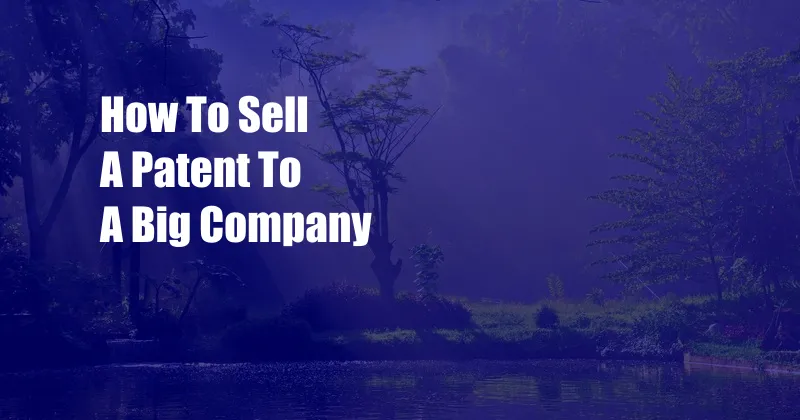
How to Sell a Patent to a Big Company
Patents are a valuable asset for inventors, but knowing how to sell one to a big company can be a daunting task. This comprehensive guide will provide you with the insights and strategies you need to navigate the process successfully.
Selling a patent is often the culmination of years of hard work and innovation. To maximize the value of your patent, it is crucial to understand its worth and identify the companies most likely to be interested in acquiring it. With careful preparation and a well-executed sales pitch, you can increase your chances of selling your patent and realizing a significant return on your investment.
Understanding Your Patent’s Value
Before approaching potential buyers, it is essential to have a clear understanding of your patent’s value. Conduct thorough market research to identify comparable patents and their recent sale prices. Consult with patent attorneys, licensing experts, or brokers to obtain professional valuations. Consider factors such as the patent’s scope of protection, its potential commercial applications, and the strength of the claims.
Identifying Potential Buyers
Once you have established your patent’s value, the next step is to identify potential buyers. Start by researching companies that operate in the same industry as your invention. Explore their product offerings, patents, and research and development initiatives. Look for companies that have a history of acquiring patents and commercializing innovative technologies.
Networking events, industry conferences, and online platforms like LinkedIn can be valuable resources for connecting with potential buyers. Reach out to key executives and decision-makers within the companies you have identified. Attend industry events where you can interact with prospective buyers.
Preparing Your Sales Pitch
Your sales pitch is a crucial element in convincing a big company to acquire your patent. Craft a clear and concise presentation that highlights the key features and benefits of your invention. Quantify the potential commercial value of your patent by providing data on market size, potential revenue streams, and cost savings.
Demonstrate how your patent aligns with the buyer’s strategic objectives and complements their existing product or technology roadmap. Be prepared to answer questions about the patent’s ownership, licensing status, and any potential infringement issues.
Negotiating the Sale
Once you have found a potential buyer, it is crucial to negotiate the terms of the sale. This will involve determining the purchase price, licensing fees, royalties, and other contractual considerations. It is essential to seek legal advice from a patent attorney to ensure that your interests are protected.
Be prepared to compromise and negotiate on certain terms, but don’t undervalue your patent. Remember that your invention is a valuable asset that has the potential to generate significant revenue for the buyer.
Closing the Deal
Once the terms of the sale have been agreed upon, it is essential to finalize the contract and transfer ownership of the patent. Work with your legal counsel to ensure that the contract accurately reflects the agreed-upon terms.
Be patient and persistent throughout the sales process. Selling a patent to a big company can take time and effort, but with the right preparation and execution, you can maximize the value of your invention and reap the rewards of your hard work.
FAQ
Q: What is the best way to find potential buyers for my patent?
A: Conduct market research, attend industry events, and utilize online platforms like LinkedIn to connect with key executives and decision-makers in companies that are likely to be interested in your invention.
Q: How can I determine the value of my patent?
A: Consult with patent attorneys, licensing experts, or brokers to obtain professional valuations. Consider factors such as the patent’s scope of protection, its potential commercial applications, and the strength of the claims.
Q: What are some tips for negotiating the sale of my patent?
A: Be prepared to compromise on certain terms, but don’t undervalue your patent. Seek legal advice from a patent attorney to ensure that your interests are protected. Be patient and persistent throughout the sales process.
Q: What is the importance of a well-crafted sales pitch?
A: Your sales pitch is crucial for convincing a big company to acquire your patent. Highlight the key features and benefits of your invention, demonstrate its alignment with the buyer’s strategic objectives, and quantify its potential commercial value.
Q: Are there any resources available to help me sell my patent?
A: Patent attorneys, licensing experts, and brokers can provide valuable assistance with patent valuation, sales negotiation, and contract drafting. They can also help you identify potential buyers and navigate the complexities of the patent sales process.
Conclusion
Selling a patent to a big company can be a transformative experience for inventors. By understanding your patent’s value, identifying potential buyers, preparing a compelling sales pitch, negotiating the terms of the sale, and closing the deal effectively, you can maximize the return on your investment and open up new opportunities for innovation and commercial success.
If you are considering selling a patent, I encourage you to take the next step and reach out to potential buyers. With the right preparation and execution, you can achieve your goals and contribute to the advancement of technology and industry.